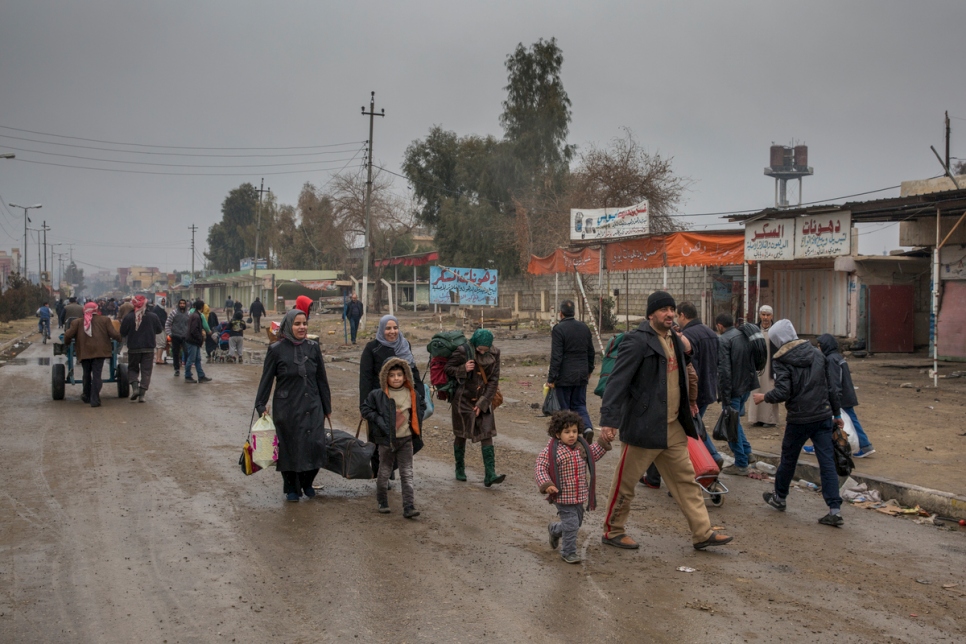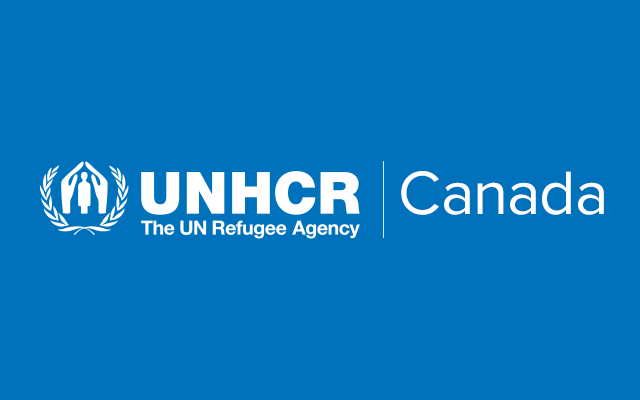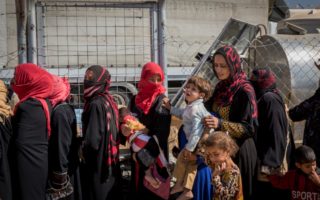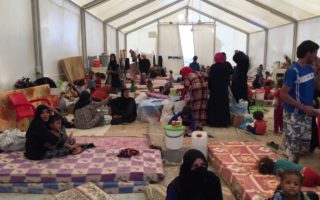Fleeing residents highlight danger, lack of food and water for hundreds of thousands of civilians who remain trapped in militant-held areas of Iraq’s second largest city.

Residents leave eastern Mosul’s Al Sukar neighbourhood after it was retaken by Iraqi forces. © UNHCR/Ivor Prickett
MOSUL, Iraq – As darkness fell over Mosul, Saad*, 45, put his injured son on his back and clambered over the ruined remains of a bridge over the Tigris River, in a desperate attempt to reach the government-controlled east.
“We left at nightfall and I carried him on my back because he can’t walk,” says Saad, who carried 21-year-old Haitham* with the help of his other sons. “We kept switching every 30 minutes because it was a long way.”
When Saad made the crossing a few weeks ago it was still possible to climb over the Fourth Tigris bridge, which had been destroyed in a coalition airstrike to prevent extremists from resupplying. But as they picked their way across the remains of the span, militants shot at them.
He made his escape to try to get treatment for Haitham – who was injured in a blast two years ago – at a trauma stabilization unit in eastern Mosul, and after extremists had killed another of his sons. “Some kids passed away because the water was not clean,” he adds, describing the humanitarian situation in western Mosul.
“The price of food there is so expensive; there is no power, no water and no gasoline.”
“We knew it was dangerous but we had to come to this side,” he said. “My family is still on the other side. The price of food there is so expensive; there is no power, no water and no gasoline.”
Saad says extremists are executing families and not letting anyone cross the river. Some attempting to flee are resorting to paying smugglers US$200 to take them across by boat, but those that get caught face summary execution.
The government-led operation to retake Mosul is now in its fourth month. Iraqi security forces have consolidated their hold on the city’s eastern neighbourhoods. But on the west bank of the Tigris River, hundreds of thousands remain trapped under opposition control with limited food and no access to clean water.
This week, UN agencies and humanitarian partners expressed deep concern for the fate of civilians living in the west of the city, where the effort to retake the city is expected to intensify in the coming weeks, as well as in Hawiga, to the south.
Meanwhile, civilians living in eastern neighbourhoods close to the front lines are at risk of incoming fire and in desperate need of humanitarian aid.
Since the start of the military offensive on October 17, some 163,000 people have fled eastern Mosul and surrounding areas, with most now living in camps run or supported by UNHCR, the UN Refugee Agency. But many more have remained in their homes as fighting rages around them, needing food, water, power and medical care.
In late January, UNHCR staff visited residents in the newly accessible neighbourhoods of Zuhoor, Sukkar and Nuar in eastern Mosul. This was the first time UNHCR was able to reach these areas, UNHCR has assisted almost 9,000 families with emergency kits inside the newly-accessible areas of Mosul.
Among civilians caught up in the fighting for the east of the city was Basher Mouthaffr, 42. “I was praying in the mosque and as soon as I left I was struck by a mortar blast,” he says of the attack that lodged shrapnel in his back and broke both his legs, leaving him unable to walk.
“I was praying in the mosque and as soon as I left I was struck by a mortar blast.”
Basher was transferred to a hospital in western Mosul, while his wife and three children remained in their home on the government side of the front line. Basher is originally from Sinjar in western Ninewa but fled to Mosul when his hometown was taken in August 2014.
When Iraqi forces pushed further west on 12 January, Basher was finally able to cross back over the river and reach the government lines, reuniting with his wife and children once more. Unable to walk, he was pushed in a wheelbarrow across the front lines by neighbours and friends.
“My heart was broken twice, because I got hit and because I didn’t have my family with me,” he says, as he sat in his family’s living room with splints in his leg, two days after returning home to Al-Zuhour.
On the wall hung a battery charger the family were using due to intermittent power while outside, residents had dug a well to collect ground water after water pipes were damaged in the fighting. However the water is unclean and drinking it has made people sick.
*Names changed for protection reasons
Written by Cathy Otten
Article originally posted on unhcr.org.





